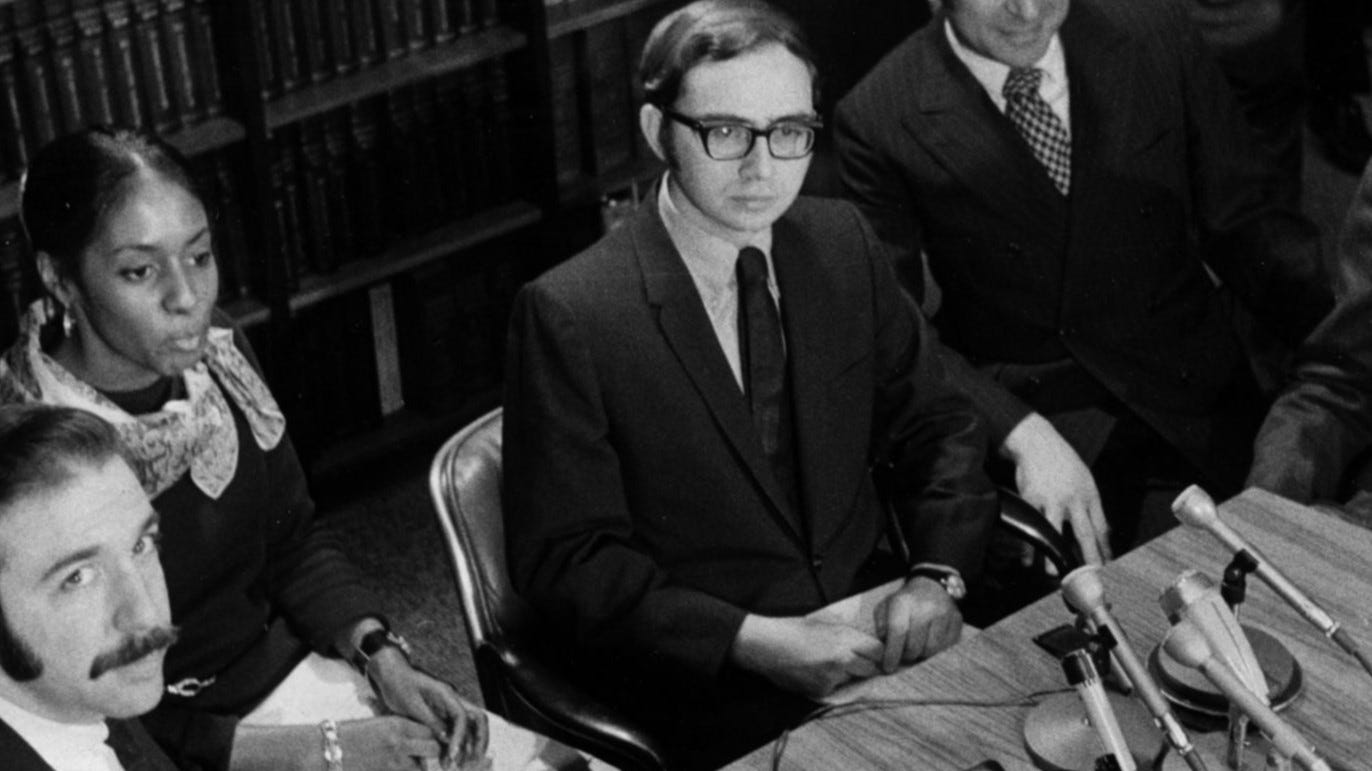THE ILLINOIZE: Monday Free for All...Illinois' complicated red flag laws...The end of Shakman...Sex Ed standards...Abortion funding
August 8, 2022
Good morning, Illinois.
I’ll be filling in on WMAY in Springfield again this morning. I’ve been nibbling around the edges with this topic for a long time, so this morning I’m going all in: what is wrong with the Republican party and how can it be saved? Or should it be saved?
I’ll be joined by national political figures Rick Tyler and Mark McKinnon, former Congressman John Shimkus, and Congressman Adam Kinzinger (R-Channahon), who sits on the January 6 committee.
Join me live this morning on WMAY in Springfield or online at www.wmay.com.
Gov. JB Pritzker speaks at a City of Chicago Renewable Energy press conference on the south side at 1:30. Sen. Darren Bailey will be endorsed by the FOP in Chicago at 10am.
It’s exactly three months today (by date) to Election Day and it’s the start of State Fair week here in Illinois, so I’m going to offer a special for new subscribers.
The first Illinois State Fair was held in 1853. So, we’ll knock $18.53 off the price of a yearly subscription if you sign up this week. If you’ve been planning to subscribe or have been on the fence, you may as well save a little cash in the process.
Sign up here:
Let’s get to your Monday Free for All:
YOUR MONDAY FREE FOR ALL
(note: we’re not responsible for paywalls and restrictions from other news outlets)
In wake of Highland Park massacre, law on firearms restraining orders in Illinois seen as confusing and underused: police leaders, experts (Chicago Tribune)
A group of law enforcement officials and experts from around Illinois and across the country gathered in mid-June to begin crafting a plan to increase awareness among the general public and fellow cops of a three-year-old state law aimed at keeping guns out of the hands of potentially dangerous people.
About midway through the agenda, Illinois State Police Director Brendan Kelly posed a direct question to the nearly two dozen in attendance, according to minutes of the meeting: “Why are (firearms restraining orders) not being used?”
During a short discussion, at least one police leader noted there was confusion about when and how to use the orders, which allow a judge to temporarily bar ownership of a firearm if a person is deemed a danger to themselves or others.
About two weeks later, a gunman who had allegedly made comments threatening others and had a history of troubling, firearm-related postings online opened fire at the Highland Park Independence Day parade, killing seven and wounding dozens of others in yet another deadly mass shooting that grabbed the nation’s attention.
In the days after the shooting, Illinois Gov. J.B. Pritzker told CNN the state needs to look at “changing some of the verbiage in the law on red flags so that something could have been filed that would have prevented” [the shooter]from being able to obtain a firearm owner’s identification card and, ultimately, a gun.
Whether a restraining order could have prevented the Highland Park shooting is unclear. But those familiar with Illinois law say public details of the case appear to suggest an intervention could have been considered and authorities should examine why it was not.
“It’s a tool in the toolbox, and they need to know when to implement it,” said state Rep. Denyse Wang Stoneback, a Skokie Democrat and former gun violence prevention advocate. “This is the kind of situation the firearms restraining order was designed to address.”
Republicans talk a lot about enforcing the laws that currently exist. How about making the laws that exist useful?
Related: A year after Officer Ella French was killed during a traffic stop, Lightfoot and Pritzker join police officials to honor her memory (Chicago Sun-Times)
Team Pritzker wins release from Shakman decree, a notorious fixture of Illinois politics (Crain’s Chicago Business)
A federal appeals court ruling Friday released Gov. J.B. Pritzker and state agencies from the Shakman decree, a set of restrictive hiring rules meant to curb political patronage jobs that’s been in effect for half a century.
“The power to hire, fire, and establish accompanying policies needs to return to the people of Illinois and the governor they elected,” Judge Michael Scudder Jr. wrote in a ruling from a 7th U.S. Circuit Court of Appeals panel. “The federal courts will remain open to decide individual cases of alleged constitutional violations should they arise. But no longer shall the governor’s employment practices and policies have to win the approval of a United States court.”
The ruling could be a significant victory for Pritzker, who moved to vacate the decree but was denied in district court before appealing to the 7th Circuit.
A lawsuit that independent political candidate Michael Shakman filed in 1969 against Cook County set in motion what would become the Shakman decrees, which were placed on the state of Illinois and local governments throughout the state, including the city of Chicago, to outlaw patronage jobs given to political allies rather than qualified applicants.
In 1972, Shakman and the government reached a “mutually agreed-upon and court-approved remedy for the past practices that infected state and local employment decisions,” Scudder said in the decision.
Related: Half a century and six U.S. judges later, court oversight of state hiring ends — but lawyer Shakman says it’s too soon (Chicago Sun-Times)
Illinois adopts standards for sex education in public schools, including lessons for elementary students (Shaw Media)
Sex and health education have been taught in Illinois schools for decades, but a new law Gov. JB Prtizker signed last summer has caused concerns among some parents who feel it’s not appropriate for children.
The law adopts the National Sex Education Standards, which include guidelines for what should be taught in districts that choose to teach comprehensive sex education. The law includes a personal health and safety program for elementary school children and sets standards and guidelines districts must include in their curriculum for all grade levels.
Sex education is not required in Illinois schools, allowing districts to opt out from offering such a program. Parents also can opt their children out from receiving the lessons if their school does teach comprehensive sex education.
Districts can choose their own curriculum for sex education programs, but the curriculum must align with the NSES guidelines.
Kim Cook, a St. Charles resident who is a former elementary school nurse and a certified health education specialist, is the founder of Sex Education Alliance, an organization composed of independent sex education professionals who work to make sex education more accessible.
“Despite what some politicians say, the vast majority of parents would like sex education to be taught in school,” Cook wrote in an email. “Many parents are uncomfortable talking to their kids about this part of the human experience. By teaching sex ed in school, it opens up the lines of communication between parent and child.
Related: Most McHenry County school districts will not adopt new ISBE sex ed standards (Shaw Media)
Regulatory work behind 1 million EV push in full swing in Illinois (Capitol News Illinois)
Ten months after Illinois lawmakers passed the Climate and Equitable Jobs Act which set a goal of putting 1 million electric vehicles on state roads by the end of the decade, state agencies are engaged in a flurry of regulatory planning aimed at meeting those goals.
The effort to electrify the state’s transportation sector and ensure the power grid can meet increased demand involves the Illinois Commerce Commission, Illinois Environmental Protection Agency, the state’s Department of Transportation, and Illinois’ two largest public utilities, among others.
Between those agencies and utilities, there’s hundreds of millions of federal, state and ratepayer dollars available for EV charging infrastructure, vehicle rebates and other plans aimed at accelerating EV adoption.
While the regulatory force behind CEJA lies with several agencies, the task of ensuring all of them are working together lies in the hands of the state’s electric vehicles coordinator.
That person is Megha Lakhchaura, who was appointed to the position officially on July 1 at a salary of $180,000 after serving in an administrative capacity at IEPA since April.
She has previously served as the director of policy in North America for the electric vehicle supply company EVBox, policy director for the rooftop solar and battery storage provider Sunrun Inc., and public utilities regulatory analyst for the California Public Utilities Commission.
It’s a diverse private sector and regulatory experience which she said has helped her hit the ground running.
“So the job is basically figuring out how all of these pots of money work together,” Lakhchaura said in a recent interview with Capitol News Illinois. “What are the pieces that we have to look at? Where do we put our resources? How do we think of things comprehensively and having a comprehensive charging strategy for the state?”
Pritzker, IDPH director announce new funds for reproductive health services (State Journal-Register)
Gov. JB Pritzker and newly-minted Illinois Department of Health Director Dr. Sameer Vohra have detailed new funding sources for reproductive health services as demand grows in the post-Roe v. Wade world.
During a conference held at the Chicago Family Health Center, Pritzker, who describes abortion as health care, announced increased reimbursement rates for abortion services along with IDPH sending $2 million to the Title X family funding program.
"In Illinois, we trust women to make their own decisions about their bodies," the Democratic governor said on Thursday, adding that service providers had been working overtime since the overturning of Roe v. Wade.
"As long as I am governor of Illinois, we will continue to protect and support reproductive health providers and safeguard reproductive freedoms."
While fellow Democrats expressed gratitude to the Pritzker administration, the same could not be said of Illinois Right to Life ‒ a non-profit, anti-abortion and anti-euthanasia state organization.
Amy Gehrke, IRL executive director, called the investment "absolutely outrageous" in a Friday phone interview with The State Journal-Register.
"Illinois's abortion laws are completely out-of-sync with mainstream opinion on the issue," she said. "Clearly, if you read in between the lines with what he's doing, he is increasing funding for out-of-state women to come to Illinois for abortions."
I didn’t get an answer when I asked last week where the Governor has the budgetary authority to do this, but I’ll keep checking. If you know, drop me a note.
JOIN US













